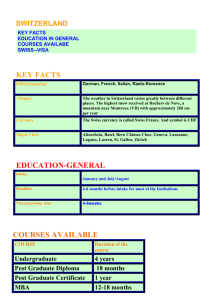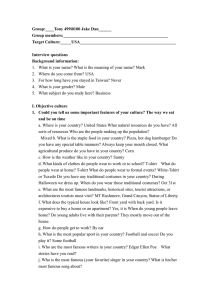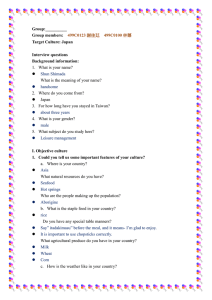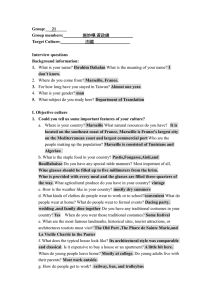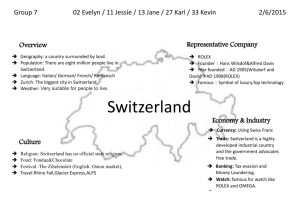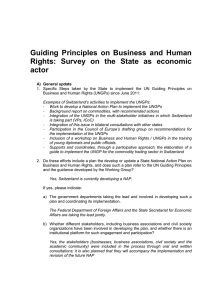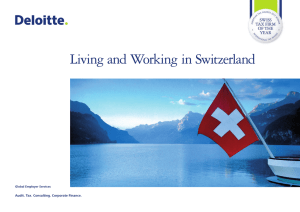Group members:499C0136 Culture: Interview questions
advertisement
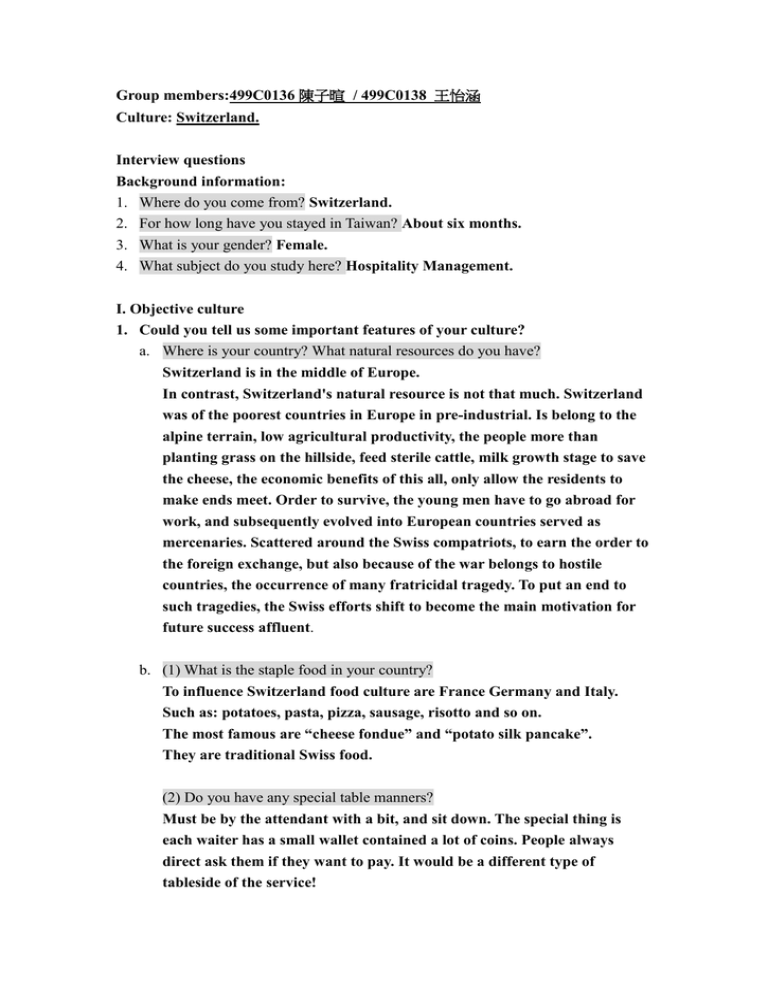
Group members:499C0136 陳子暄 / 499C0138 王怡涵 Culture: Switzerland. Interview questions Background information: 1. Where do you come from? Switzerland. 2. For how long have you stayed in Taiwan? About six months. 3. What is your gender? Female. 4. What subject do you study here? Hospitality Management. I. Objective culture 1. Could you tell us some important features of your culture? a. Where is your country? What natural resources do you have? Switzerland is in the middle of Europe. In contrast, Switzerland's natural resource is not that much. Switzerland was of the poorest countries in Europe in pre-industrial. Is belong to the alpine terrain, low agricultural productivity, the people more than planting grass on the hillside, feed sterile cattle, milk growth stage to save the cheese, the economic benefits of this all, only allow the residents to make ends meet. Order to survive, the young men have to go abroad for work, and subsequently evolved into European countries served as mercenaries. Scattered around the Swiss compatriots, to earn the order to the foreign exchange, but also because of the war belongs to hostile countries, the occurrence of many fratricidal tragedy. To put an end to such tragedies, the Swiss efforts shift to become the main motivation for future success affluent. b. (1) What is the staple food in your country? To influence Switzerland food culture are France Germany and Italy. Such as: potatoes, pasta, pizza, sausage, risotto and so on. The most famous are “cheese fondue” and “potato silk pancake”. They are traditional Swiss food. (2) Do you have any special table manners? Must be by the attendant with a bit, and sit down. The special thing is each waiter has a small wallet contained a lot of coins. People always direct ask them if they want to pay. It would be a different type of tableside of the service! (3) What agricultural produce do you have in your country? Such as: corn, grapes, rice, wheat and beans. c. How is the weather like in your country? The high temperature does not exceed 25, the lowest temperature to -35. d. (1) What kinds of clothes do people wear to work or to school? Determined according to the school have uniforms or not. (2) What do people wear at home? T-shirt...We have heater inside. (3) What do people wear to formal event? Suit. (4) Do you have any traditional costumes in your country? Yes, we have a lot of traditional costumes in our country. (5) When do you wear those traditional costumes? Depend on what date it is. e. What are the most famous landmarks, historical sites, tourist attractions, or architectures tourists must visit? St. Peter's Cathedral, Monument de la Reformation, Chateau de Chillon, Jungfrau, Kapellbrucke, Gletschergarten & Lowendenkmal…and so on. f. (1) What does the typical house look like? (2) Is it expensive to buy a house or an apartment? Depend on you live in urban areas or not. It’s really hard to afford a house. Most people are used to rent. (3) When do young people leave home? Nearly two years of age. (4) Do young adults live with their parents? If the students do not live on campus should be living with the family. g. How do people get to work? After graduation or in school are possible. h. (1) What is the most popular sport in your country? Tennis and skiing. (2) Do you play it? Not often. i. (1) Who is the most famous (your favorite) singer in your country? ARDAYFIO MANUELA (2) What is his/her most famous song about? Every one. 2. Regarding the items mentioned in question 1, what differences do you find between your culture and Taiwanese culture? II. Subjective Culture 1. Could you tell us the subjective feature of your culture? Very punctual. a. Time: (1) Is it important to be punctual? Yes, it is. (2) Do people always arrive on time? They will arrive before 15 minutes. (3) Is it ok to arrive late? Impolite. b. Invitation: (1) Is it normal to invite a friend to have dinner at home? It’s not normal if you live with family. (2) Or people meet in the public places, like restaurants or cafés? Yes. (3) Do you need to bring something if you are invited? Sure. c. Greeting: (1) How do people greet each other when they meet? Hug. (2) Do you shake hands, bow, hug, or kiss? Yes, we do. (3) What do you say to each other? Wie geht es Ihnen?(德文 問好的意思) d. Agreement and disagreement: How do you express agreement or disagreement? Acceptance or refusal? Euphemistic expression of negation. e. Directness: Is it polite to be direct? Or do people tend to be indirect? According to the situation. f. Do people use body language a lot? Is it polite to touch someone while speaking? Yes, it helped to strengthen the tone. g. Are there any taboos foreigners must know before visiting your countries? What do you think are the underlying reasons of those taboos? Relax friendly and punctual. 2. Regarding the items mentioned in question 2, what differences do you find between your culture and Taiwanese culture? Taiwan, a traditional Asian culture, but Switzerland is also a very conservative country within the EU. The biggest difference is the schedule, the Taiwanese like the nightlife we go home and rest from work. III. 就你自己的經驗,對這個訪談活動有何心得感想: 1. 我覺得這個訪談活動有何優點? 我認為藉由這個訪談而讓我真正認識瑞士這個國家的文化,過去從來不會知 道瑞士是歐洲最貧窮的國家。 2. 我學到什麼新的文化知識? 原來不是每個國家都是喜歡夜生活的,而瑞士不同於台灣,有著規律的生活。 3. 我學到什麼新的語言或單字? Wie geht es Ihnen?(德文 問好的意思) 4. 我在和外籍學生中運用什麼溝通技巧來理解和表達? 沒有,我們訪談的對象是到瑞士遊學的朋友。 5. 我覺得訪談活動有什麼缺點? 沒有,很完美。 6. 我在尋找國際學生訪談的過程是否有任何困難? 原本我們是要尋找澳門的學生,但是因沒有太多時間,所以只好請求朋友幫 助。
